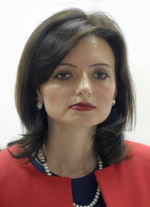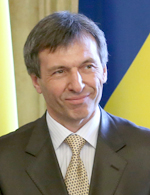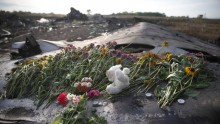Russia had promised and vetoed a draft of a UN Security Council (UNSC) resolution calling for an international tribunal on the crash of the Malaysian Airlines MH17 flight last July in Donetsk oblast. Interestingly, it was one of the 15 permanent and non-permanent Security Council members that vetoed the resolution, with China, Venezuela, and Angola abstaining. All told, there were 11 yeas although nine would be enough to pass the resolution.
After the vote, Australian Foreign Minister Julie Bishop declared that Russia’s veto “only compounds the atrocity… the anticipated excuses and obfuscation by the Russian Federation should be treated with the utmost disdain… The exercise of the veto today is an affront to the memory of the 298 victims of MH17 and their families and friends.”
Dutch Foreign Minister Bert Koenders said: “I find it incomprehensible that a member of the Security Council obstructs justice in a tragedy that has affected so many. Impunity will give a very dangerous signal,” adding that it was a threat to the safety of civil aviation, the safety of all people (two-thirds of the MH17 passengers were Dutch nationals).
The US ambassador to the United Nations, Samantha Power, told the council that “no veto will stand in the way of this heinous crime being investigated and prosecuted.”
Ukrainian UN Ambassador Yurii Serhieiev wrote on Twitter re his Russian counterpart who blamed Ukraine for the MH17 crash: “After torpedoing the resolution, Mr. Churkin expressed sympathy for the victims of the disaster… The cynicism of the Russian Federation knows no bounds…”
Despite the veto, the initiators of the resolution are not going to give up struggle. At a news conference, the Dutch foreign minister declared that the Netherlands, Malaysia, Australia, Belgium, and Ukraine “will stay together to find as quickly as possible a legal alternative… there are clearly a number of legal options available, but it would be dependent upon what we were able to put in place: It might be a combination of countries, it might be a combination of legal systems.”
Prime Minister David Cameron responded to the Russian veto of the resolution saying: “I think it is infuriating and completely wrong… We cannot let one country stand in the way of getting to the truth or one country stand in the way of getting justice. If we cannot set up a tribunal through the United route, we will have to look at other ways to make sure this is done. As in the case of the Lockerbie disaster [in 1988], justice must be done.”
The Day asked for expert opinion on Russia’s veto and legal options in bringing to account those responsible for the shooting down of MH17.
Mariana BETSA, spokesperson, head of the Information Policy Department, Ministry of Foreign Affairs of Ukraine:
 “We are profoundly disappointed by the vote on the draft UNSC resolution aimed at establishing an international tribunal to bring to account those responsible for the shooting down of MH17 on the evening of July 29, 2015. Russia’s veto was predictable. At the same time, all the countries who had come up with the initiative had been working hard to persuade the SC members, including Russia, to support the draft resolution. In fact, we had received support from most countries and Russia had found itself isolated. Russia’s was the only veto and it was aimed against international peace and security, against international justice.
“We are profoundly disappointed by the vote on the draft UNSC resolution aimed at establishing an international tribunal to bring to account those responsible for the shooting down of MH17 on the evening of July 29, 2015. Russia’s veto was predictable. At the same time, all the countries who had come up with the initiative had been working hard to persuade the SC members, including Russia, to support the draft resolution. In fact, we had received support from most countries and Russia had found itself isolated. Russia’s was the only veto and it was aimed against international peace and security, against international justice.
“Our priority remains the same: the instituting of an UN-supported tribunal. This is the best option, considering that this tribunal would provide for an unbiased and independent investigation [into the air crash]. We believe that UNSC resources have not been exhausted to that end. It is our moral duty toward those who died in the crash to ensure justice, to bring those responsible to account. That tragedy was also a national tragedy for Ukraine. We will not rest until justice is done.
“We’re studying various international and national legal options, but it would be premature to discuss any of them now. Besides, they will have to be coordinated with all the countries who took part in the drafting of the resolution. I’d like to stress that we have been making every effort to have the guilty party brought to account. We’ll resume work on this very shortly and we’ll work hard!”
How can you keep working with the UNSC, considering that Russia can veto any resolution? Does Ukraine have Plan B or Plan C?
“We aren’t commenting on our options, for the obvious reason. We’re working on them.”
In an interview with Hlavkom our Foreign Minister Klimkin mentioned the possibility of a mixed court. One is reminded of the assassination of ex-Prime Minister of Lebanon Rafic Hariri [in 2005]. The United Nations enacted the Special Tribunal for Lebanon in 2007.
“Indeed, this is part of UN practice, but there are other options and precedents. We’re working on them.”
Mykola SIRY, Ph.D. (Law), senior fellow, secretary, Academic Council, Koretsky Institute of State and Law, National Academy of Sciences of Ukraine:
 “Of course, the session yesterday [UNSC, July 29. – Author] was of the utmost importance. The international democratic community has made it perfectly clear that a transparent, professionally effective investigation into the crash of MH17 is what everybody wants.
“Of course, the session yesterday [UNSC, July 29. – Author] was of the utmost importance. The international democratic community has made it perfectly clear that a transparent, professionally effective investigation into the crash of MH17 is what everybody wants.
“That session also clearly demonstrated that Russia is involved, because its veto was the only one. Russia has shown the entire international democratic community that it does not want such crimes investigated and that it will not allow the criminals to stand trial.
“By vetoing [the draft resolution] Russia has taken another step away from the democratic community, in the direction of self-isolation. The world’s leading countries, those that suffered [whose citizens died on board MH17], as well as Ukraine, will take appropriate measures in forming an international tribunal – and I feel reasonably sure that this tribunal will become a reality.”
What are the legal options?
“I guess the issue will be considered by the UN General Assembly in the first place; this would be a perfectly logical step to take, considering that during the session almost all delegations stressed that a meeting of the Security Council should be called to consider the shooting down of MH17. Past year, SC unanimously resolved to carry out an investigation and bring those responsible to account. By exercising its veto this time Russia acted counter to that resolution which it also voted for past year. It stands to logic that the issue should be placed on the UNGA agenda and dealt with along two lines: (a) why the UNSC resolution was vetoed and (b) why prevent justice from being done.”
Do you think UNGA could pass a resolution establishing an international tribunal? This would take yeas from two-thirds of the member countries. Could be a problem, couldn’t it?
“I believe this option is realistic enough. Russia, of course, will resist, as will some countries while playing their own political games. Still, a positive UNGA resolution is a possibility because it will relate to justice and a way to ensure it. It will not point an accusing finger at anyone, nor will it relate to sanctions or restrictions. This is reason enough for the important international community members to support it.”
Mykyta Soloviov wrote on Facebook that forming an international tribunal under the auspices of UNGA could be a problem because of the United States; Washington is blocking the passage of a draft resolution on such a tribunal in regard to Israel and may well be loath to have a precedent. What do you think?
“I think there is nothing to worry about. When it comes to the establishing of an international tribunal, all the pros and cons are considered. The history of international law and order offers numerous examples, including extremely sophisticated ones. In our case there is a difference in principle between any other cases and what happened in Ukrainian airspace, meaning Ukrainian jurisdiction. From the standpoint of international law and order, everything is perfectly clear in our case. There is an act of aggression against Ukraine, an act of terrorism against a civilian aircraft, a glaring breach of the civilian aviation rules and procedures. Here no parallels can be drawn with complicated international conflicts when a people is fighting to implement its right to self-determination or for a disputed territory. In our case there are no reasons, in terms of international law, for turning the situation into a sophisticated multidimensional problem.”
What should be done to table an international tribunal proposal and put it to the UNGA vote? Could this happen during the session in the fall?
“This issue is likely to be subject to diplomatic discussions, clarifying certain possibilities in terms of UN agenda – for example, in the context of meetings and procedures. There is also the variety of procedures that have to be observed within the UN framework. The issue will be studied at length and depth. However, it is safe to assume that it will be on UNGA agenda before long. I believe there will be enough people within that framework who will want this done as quickly as possible.”
Our ex-Foreign Minister Volodymyr Ohryzko wrote on Twitter, concerning the session: “Russia has lost the right to be a member of the UN Security Council. Ukraine should initiate the pertinent proceedings at the UN.” Perhaps the time has come for this issue to be placed on the UNGA agenda?
“He has a point there, but, if and when, the process would be political. A number of countries would be willing to expel Russia from the Security Council, as soon as possible. Other countries would take a milder, more realistic stand that would bring actual results.”
Russia could end up having her veto right restricted to certain matters, as proposed by France, this being part of the UN reorganization program.
“Generally speaking, the veto right for a country involved in a conflict is absolutely illogical. Apparently, the UNGA regulations have to be amended, so that a member country, when found to have been involved in an international conflict, will be denied that right. In other words, such a country will retain the right to abstain or vote for, but never veto a resolution. The current situation when a UNGA member country can do as it pleases runs counter to logic. A way out of this illogical situation must be found.”
Experts mention other legal options, including referring the case to the International Criminal Court. Maybe it’s best to start considering these options before events at the UN take their course?
“I don’t think there will be any mixing of processes. Rather, there will be step-by-step progress. First, the UN procedures and proceedings. If failing, those out of UN jurisdiction will be applied. In fact, the International Criminal Court operates in keeping with the UN Charter.”
President Petro Poroshenko wrote on Twitter after Russia’s veto: “Ukraine will not stop at this. Those responsible must be punished. This is our duty toward the victims and their close and dear ones.” What do you think our government should do in this context?
“Information, first and foremost. The international community must be provided with facts and figures, repeatedly told about what actually happened during the session. All the i’s must be dotted and t’s crossed diplomatically. The better the efforts Ukraine makes in that direction, the better the prospects of the UNGA vote, the better the possibility of the media relaying the truth about MH17 to the readers and viewers across the world.”
What about Ukraine bringing Russia to court as an aggressor state and sponsor of terrorism?
“This would make legal sense if Ukraine took any steps in that direction, if its relations with Russia were in the victim-aggressor-state format. As it is, the resolutions passed by the Verkhovna Rada are declarative. Otherwise the official procedures would include martial law imposed on a certain part of Ukrainian territory, designation of the aggressor, official appeals to the United Nations. The whole international and domestic law package. Ukraine has done nothing that way.”
Why?
“A good but complicated question. It has more to do with consequences, including the balance of power, political choice, and international legal strategy.”
Can’t the public prompt the government to get active in that direction, primarily in recognizing Russia as an aggressor state?
“The main mechanism here is as follows: the government’s duty is to protect the sovereign national territory and free it from the aggressor. The sacred duty of the people is to defend their land. These duties are the solution to the problem. So far we have seen the fulfillment of these duties being contained.”








